- Home
- Dave Eggers
The Best American Nonrequired Reading 2011
The Best American Nonrequired Reading 2011 Read online
Table of Contents
Title Page
Table of Contents
Copyright
Foreword
Introduction
I
Best American Fax from Don DeLillo
Best American WikiLeaks Revelations
Best American New Band Names
Best American Very Short Story
Best American Even Shorter Story
Best American Lawsuits
Best American Adjectives, Nouns, and Verbs Used in Reporting on the Gulf Oil Spill of 2010
Best American New Entries to the O.E.D. Beginning with the Letter H
Best American Profile of an International Pop Star
Best American Commune Names
Best American Ominous Place Names
Best American Call of Duty Handles
Best American WiFi Network Names
Best American Best American Categories that Got Cut
Best American Mark Twain Quotes
Best American Poems Written in Response to Arizona Senate Bill 1070
II
Second Lives
An Oral History of Adama Bah
The Women
We Show What We Have Learned
Art of the Steal
Le Paris!
Game of Her Life
Solitude and Leadership
The Deep
Orange
Butt and Bhatti
Roger Ebert: The Essential Man
What Killed Aiyana Stanley-Jones?
Weber's Head
For Us Surrender Is Out of the Question
A Hole in the Head
The Suicide Catcher
Homing
Pleiades
The Imaginist
Mid-Life Cowboy
Market Day
The Boys' School, or the News from Spain
Contributors' Notes
The Best American Nonrequired Reading Committee
Notable Nonrequired Reading of 2010
About 826 National
Copyright © 2011 by Houghton Mifflin Harcourt Publishing Company
Foreword copyright © 2011 by Dave Eggers
Introduction copyright © 2011 by Guillermo del Toro
ALL RIGHTS RESERVED
The Best American Series is a registered trademark of Houghton Mifflin Harcourt Publish-
ing Company. The Best American Nonrequired Reading is a trademark of Houghton Mifflin
Harcourt Publishing Company.
No part of this work may be reproduced or transmitted in any form or by any means, elec-
tronic or mechanical, including photocopying and recording, or by any information storage
or retrieval system without the prior written permission of the copyright owner unless such
copying is expressly permitted by federal copyright law. With the exception of nonprofit
transcription in Braille, Houghton Mifflin Harcourt is not authorized to grant permission
for further uses of copyrighted selections reprinted in this book without the permission of
their owners. Permission must be obtained from the individual copyright owners as identi-
fied herein. Address requests for permission to make copies of Houghton Mifflin Harcourt
material to Permissions, Houghton Mifflin Harcourt Publishing Company, 215 Park Ave-
nue South, New York, New York 10003.
www.hmhbooks.com
ISSN: 1539-316X
ISBN: 978-0-547-57743-2
Printed in the United States of America
DOC 10 9 8 7 6 5 4 3 2 1
"Fax from Don DeLillo" by Don DeLillo. First published in Pen America. Copyright © 2010 by
Don DeLillo. Reprinted by permission of the author.
"Losing the Wax" by Padgett Powell. First published in Subtropics. Copyright © 2010 by
Padgett Powell.
"The Orphan Lamb" by Amy Hempel. First published in Harper's. Copyright © 2010 by Amy
Hempel.
"She Might Get Loud: M.I.A." by Gary Shteyngart. First published in GQ. Copyright © 2010
by Gary Shteyngart.
"Best American Poems Written in Response to Arizona Senate Bill 1070" by Javier O.
Huerta, Ralph Haskins, Sylvia Maltzman, and José Hernández Díaz. Certain of these poems
first appeared at www.facebook.com and www.poetryfoundation.org. Copyright © 2010 by the
authors.
"Second Lives" by Daniel Alarcón. First published in the New Yorker. Copyright © 2010 by
Daniel Alarcón. Reprinted by permission of the author.
"An Oral History of Adama Bah" by Adama Bah. First published in Patriot Acts: Narra-
tives of Post-9/11 Injustice. Copyright © 2010 by Adama Bah. Reprinted by permission of the
author.
"The Women" by Tom Barbash. First published at www.narrativemagazine.com. Copyright ©
2010 by Tom Barbash. Reprinted by permission of the author.
"We Show What We Have Learned" by Clare Beams. First published in Hayden's Ferry
Review. Copyright © 2010 by Clare Beams. Reprinted by permission of the author.
"Art of the Steal" by Joshuah Bearman. First published in Wired. Copyright © 2010 by Josh-
uah Bearman. Reprinted by permission of the author.
"Le Paris! "by Sloane Crosley. First published in How Did You Get This Number, published by
Riverhead Books, a division of Random House. Copyright © 2010 by Sloane Crosley and Ran-
dom House. Reprinted by permission of the author.
"Game of Her Life" by Tim Crothers. First published in ESPN The Magazine. Copyright ©
2010 by Tim Crothers. Reprinted by permission of the author.
"Solitude and Leadership" by William Deresiewicz. First published in The American Scholar.
Copyright © 2010 by William Deresiewicz. Reprinted by permission of the author.
"The Deep" by Anthony Doerr. First published in Zoetrope: All-Story. Copyright © 2010 by An-
thony Doerr. Reprinted by permission of the author.
"Orange" by Neil Gaiman. First published in Southwest Airlines Spirit Magazine. The story
printed in this anthology is a version slightly modified from the original, which appears in My
Mother She Killed Me, My Father He Ate Me: Forty New Fairy Tales, published by Penguin. Copy-
right © 2010 by Neil Gaiman. Reprinted by permission of the author.
"Butt and Bhatti" by Mohammed Hanif. First published in Granta.Copyright © 2010 by Mo-
hammed Hanif. Reprinted by permission of the author.
"Roger Ebert: The Essential Man" by Chris Jones. First published in Esquire.Copyright ©
2010 by Chris Jones. Reprinted by permission of the author.
"What Killed Aiyana Stanley-Jones?" by Charlie LeDuff. First published in Mother Jones.
Copyright © 2010 by Charlie LeDuff and Mother Jones. Reprinted by permission of the author and Mother Jones.
"Weber's Head" by J. Robert Lennon. First published in Salamander.Copyright © 2010 by J.
Robert Lennon. Reprinted by permission of the author.
"For Us Surrender Is Out of the Question" by Mac McClelland. First published in Mother
Jones.This article is an adaptation from McClelland's book, For Us Surrender Is Out of the Ques-
tion,published by Soft Skull Press. Copyright © 2010 by Mac McClelland. Reprinted by per-
mission of the author.
"A Hole in the Head" by Joyce Carol Oates. First published in The Kenyon Review.Copyright ©
2010 by Joyce Carol Oates. Reprinted by
permission of the author.
"The Suicide Catcher" by Michael Paterniti. First published in GQ. Copyright © 2010 by Mi-
chael Paterniti. Reprinted by permission of the author.
"Homing" by Henrietta Rose-Innes. First published in Agni.Copyright © 2010 by Henrietta
Rose-Innes. Reprinted by permission of the author.
"Pleiades" by Anjali Sachdeva. First published in Gulf Coast.Copyright © 2010 by Anjali Sa-
chdeva. Reprinted by permission of the author.
"The Imaginist" by Olivier Schrauwen. First published in Mome. Copyright © 2010 by
Olivier Schrauwen. Reprinted by permission of the artist. "More Than Words," Words and
Music by Nuno Bettencourt and Gary Cherone. Copyright © 1990 COLOR ME BLIND MU-
SIC. All Rights Administered by ALMO MUSIC CORP. All Rights Reserved. Used by Permis-
sion. Reprinted by permission of Hal Leonard Corporation."Eternal Flame," Words and Music by
Billy Steinberg, Tom Kelly and Susanna Hoffs. Copyright © 1988 Sony/ATV Music Publishing
LLC, EMI Blackwood Music Inc. and Bangophile Music. All Rights on behalf of Sony/ATV Mu-
sic Publishing LLC Administered by Sony/ATV Music Publishing LLC, 8 Music Square West,
Nashville, TN 37203. All Rights on behalf of Bangophile Music Controlled and Administered
by Songs Of Universal, Inc. International Copyright Secured. All Rights Reserved. Reprinted by
permission of Hal Leonard Corporation.
"Mid-Life Cowboy" by James Spring. First aired on This American Life.Copyright © 2010 by
James Spring. Reprinted by permission of the author.
"Market Day" by James Sturm. Excerpted from Market Day, a graphic novel by James Sturm
published by Drawn & Quarterly. Copyright © 2010 by James Sturm. Reprinted by permission
of the artist.
"The Boys' School, or the News from Spain" by Joan Wickersham. First published in Agni.
Copyright © 2010 by Joan Wickersham. Reprinted by permission of the author.
Foreword
IT IS THE TASK OF THIS FOREWORD, which will be read by no more than eleven people, to explain what this collection is. This collection is part of the Best American series, started by Houghton Mifflin sometime in the late eighteenth century as some kind of angry gesture of independence toward our British overlords. At that time, there were many Best British books, from the popular Best British Short Stories to the less popular Best British Agronomy Theses, and these books dominated the marketplace in the United Kingdom and the New World. Pretty soon the settlers of North America had had enough of collections about tea and cucumber sandwiches, and they devised to create their own series. Thus was the Best American juggernaut born.
Houghton Mifflin's goal has been to add between eight and twenty new variations to the series yearly, and about ten years ago, just after they created the Best American Paralegal Termination Notices and the Best American Tom Wopat Fan Fiction, they created this, the Best American Nonrequired Reading.
They asked me to edit the series, and I refused. They asked again, and I said sure. Then I asked around, looking for bunches of people who might help collect the material for the book. Experts said that a good source of inexpensive and noncomplaining labor was to be found in high schools, so thats where I went. Indeed, I found their wage demands to be reasonable, though the complaining part was pretty blatant false advertising. They complain all the time, and about everything. About having no place to sit. About having brought cupcakes that no one ate. About having more necessary schoolwork to attend to. About having to live some kind of life outside of the Best American Nonrequired Reading. About the fact that we don't really have heat or air conditioning in the basement where we meet. About the noise from the bar next door, especially when that one woman is practicing some kind of voodoo yoga in the basement, complete with sundry candles and loud groaning. (True story.)
The point is that there is no life outside the Best American Nonrequired Reading, and these students should know this by now. What could be better than gathering every Tuesday night in the basement of the McSweeney's offices in San Francisco, to read and discuss the best contemporary writing? There can be nothing better than poring through every publication they can find, from Agni to Epoch, from Explosion-Proof to Mome to everything in between, and then making cases for their favorites. We vote "yes" or "no" or "maybe" on each story, essay, and comic, and pretty soon we have ourselves another edition. Nothing better. Not Craisins, not the Marshall Plan.
I want to say with utter seriousness that this year's collection is one of the best that the committee has ever put together. The students found and fought for an incredible array of stories, from the most woeful and outrage-provoking to the most inspiring and life-affirming. We always endeavor to have the anthology speak about the year in which it was created, and this year's edition does that, loudly and eloquently.
We had the added pleasure this year of getting acquainted with Mr. Guillermo del Toro. Every year, the students make wish lists of cultural icons who they'd like to write the introduction to the book, and over the past years, Mr. Del Toro's name has come up often, on many lists. Then, one week this year, someone brought in an item from the web, an interview with Mr. Del Toro, wherein he said something like" The Best American Nonrequired Reading is the best collection ever and all of the students who work on it are my heroes and guide my daily actions and spiritual path." I paraphrase.
It turns out Mr. Del Toro was indeed aware of the collection, so we wrote him a letter, asked him to write the intro, and he answered in record time, with these words: "As we say in Mexico, f— yeah." The students were thrilled, and the adults were thrilled, too. Guillermo del Toro is one of the world's great film directors, but he's also a writer of wide renown, and a world-class bibliophile. His library is vast and beautiful and he speaks in his intro about his love of the physical book, an object whose survival goes hand in hand with the survival of the world and its inhabitants.
Too far? Okay.
While we're talking about adults, we want to thank Bill Joyce, one of the planets best authors of picture books, for doing this year's cover. He is a gentleman and a genius. We'd also like to thank Jesse Nathan, the series' managing editor, for his three-year service to the collection. He does the organizing, he does much of the sourcing, he does the layout and everything in between for this anthology. He has a boundless enthusiasm for the written word in all its forms, and he has inspired us all. Now he's off to Stanford, to get himself a Ph.D. in literature. We can't argue with the obvious mercenary reasoning behind this move, but still. We will miss him.
We hope you like this collection. It demonstrates, I think, just how much phenomenal writing is coming out of this continent, and how the struggles of our times are producing work of great passion and stoutness of heart. If this doesn't show the British, and doesn't prove just who is Best after all, I'm not sure what will.
In liberty,
DAVE EGGERS
San Francisco, 2011
Introduction
Learn the Question.
"My heart has followed, all my days, something I cannot name."
—Don Marquis
ONE OF MY TEACHERS LIED TO ME at an early age. I didn't know it back then, of course, but she lied nevertheless. I was in third grade in a private Jesuit school and my teacher explained the role books played in our lives: "They contain all the answers," she said. And I believed her.
Books surround me. They always have. Books have saved my life, my sanity, and my soul. I started collecting at age seven, and have never stopped. There was a time, a blissful time, when I would read a book a day, and I was able to sustain that rhythm for years. I read Borges or Rulfo or Quiroga in Spanish. Bradbury, Dickens, or Hawthorne in English and, occasionally, I even ventured into reading Marcel Schwob in French, forced to by the fact that most of his work remains untranslated.
Books have a power over me. A
fine edition of a familiar book or a new, intriguing prologue or preface makes it impossible for me to resist. As a result of this compulsion, and over the course of many years, I have been forced to acquire a separate home to lodge my library across seven distinctive rooms and multiple closets and corridors.
What we read and why we do so defines us in a profound way. You are what you read, I suppose. Browsing through someone's library is like peeking into their DNA.
Not only do I enjoy reading the titles displayed, but I gain great insight by the way they are organized: alphabetically, chronologically, thematically or, in the most compelling cases, by some obscure code known only to the organizer. "Ah—Marcel Schwob now rests shoulder to shoulder with Lord Dunsany and a few volumes away from Gustav Meyrink—brilliant!"
I have a curious ritual I follow right before a new film project starts: I thoroughly reorganize my own shelves in what has become an act of psychomagic. This physical exercise mimics my thought process. I use it to rummage through the memories and ideas of all the authors I love and cherish. I draw inspiration from them and re-ignite their thoughts in my "here and now."
The result is a monologue with many voices—borrowed, usurped, or distorted by the project at hand. I gain insight into the books I love and into my reasons for loving them. And I gain solace in their company.
Books as objects have distinct personalities, and they speak to you through them: The humble paperback edition of Oliver Twist you read when you were fifteen may seem more inviting than your finely bound Nonesuch Dickens. The specific mass, weight, and binding of a book all become part of your memory of it. The fetish of it. Its words live in you; its gospel is forever. You own the pages, the cover, the spine, hold the temple, the idol, the object of worship.
As for so many other children, my first book had pictures. Many of them did. And I thus was initiated to the fact that words are as specific as images. And there's Twain's maxim: "The difference between the almost right word and the right word is really a large matter—if's the difference between the lightning bug and the lightning." This is true for both words and images. Reading and writing words has disciplined the way I read and write images.

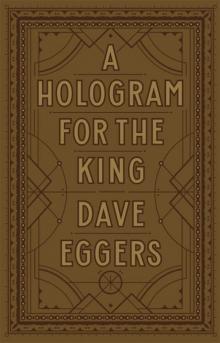 A Hologram for the King
A Hologram for the King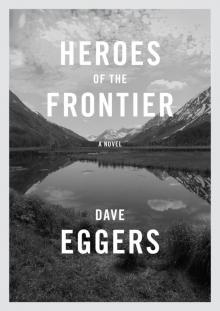 Heroes of the Frontier
Heroes of the Frontier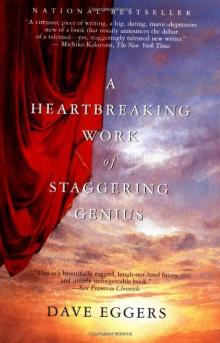 A Heartbreaking Work of Staggering Genius
A Heartbreaking Work of Staggering Genius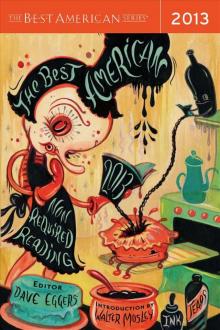 The Best American Nonrequired Reading 2013
The Best American Nonrequired Reading 2013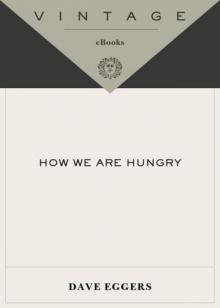 How We Are Hungry
How We Are Hungry The Circle
The Circle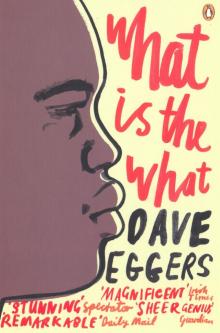 What is the What
What is the What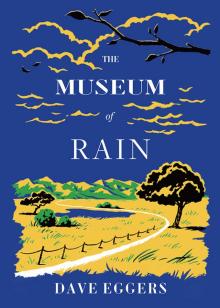 The Museum of Rain
The Museum of Rain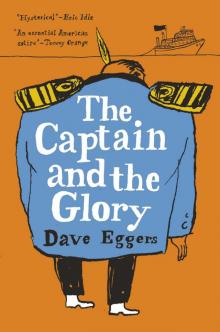 The Captain and the Glory
The Captain and the Glory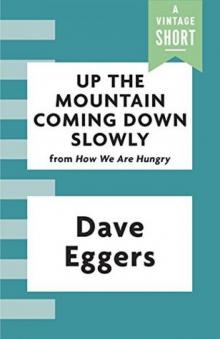 Up the Mountain Coming Down Slowly
Up the Mountain Coming Down Slowly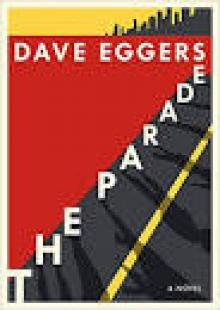 The Parade
The Parade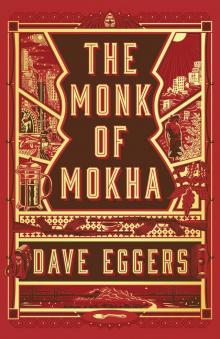 The Monk of Mokha
The Monk of Mokha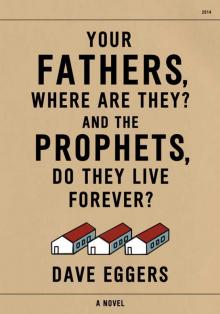 Your Fathers, Where Are They? And the Prophets, Do They Live Forever?
Your Fathers, Where Are They? And the Prophets, Do They Live Forever?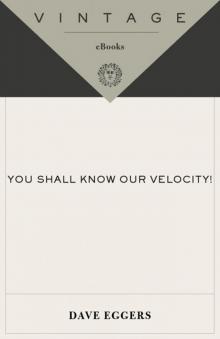 You Shall Know Our Velocity
You Shall Know Our Velocity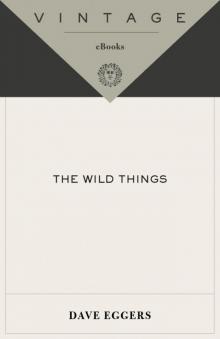 The Wild Things
The Wild Things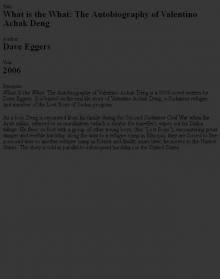 2006 - What is the What
2006 - What is the What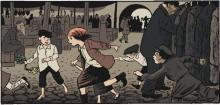 The Best American Nonrequired Reading 2011
The Best American Nonrequired Reading 2011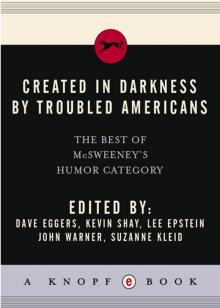 Created in Darkness by Troubled Americans
Created in Darkness by Troubled Americans